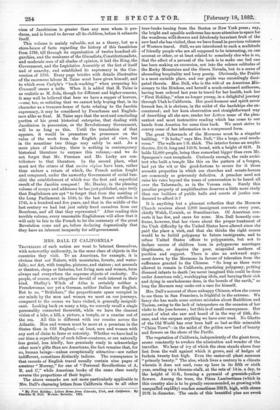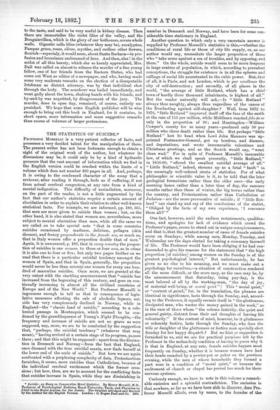MRS. DALL IN CALIFORNIA.*
TILLYNT.T.FRO Of each nation are wont to Interest themselves, with noteworthy uniformity, in the same class of objects in the countries they visit. To an American, for example, it is -obvious that not Nature, with mountains, forests, and water- falls ; not Art, with temples, pictures, and statues ; not arsenals or theatres, shops or factories, but living men and women, form always and everywhere the supreme objects of curiosity. No people, of course, are altogether devoid of such interest in their kind. Shelley's Witch of Atlas is certainly neither a Frenchwoman nor yet a German, neither Italian nor English. But to us, " Britishers," the proportionate space occupied in our minds by the men and women we meet on our journeys, compared to the scenes we have visited, is generally insignifi- cant. Looking back on many a trip, we scarcely recall a single personality connected therewith, while we have the clearest -vision of a lake, a hill, a picture, a temple, or a sunrise out of -the sea. All this is different with our cousins across the Atlantic. Men and women must be more at a premium in the States than in Old England,—at least, men and women with any sort of claim to fame or notoriety. Whether we have had in 43nr time a superfluity of such fellow-creatures, or are naturally less genial, less kindly, less genuinely ready to acknowledge other men's gifts than are Americans, the fact remains that, for us, human beings—unless exceptionally attractive—are rather indifferent, sometimes distinctly tedious. The consequence is that records of English travel usually contain nine pages of amateur " Murray," for one of "Personal Recollections of A, B, and C," while American books of the same class nearly reverse the proportions of their topics.
The above remarks are not more particularly applicable to Mrs. Dall's charming letters from California than to all other
• My First Holiday: Letters Heins from Colorado, Utak and California. By Caroline H. Dall. Baton: Roberts. 1881.
tour-books issuing from the Boston or New York press; nay, the bright and sensible authoress has more attention to spare for the wondrous wild-flowers and fabulously luxuriant fruit of the new land she has visited, than we have found in previous volumes of Western traveL Still, we are introduced to such a multitude of friendly people who are all supposed to be interesting, on one account or other, or at least related to somebody else who is so, that the effect of a perusal of the book is to make one feel one has been making an excursion, not into the solemn solitudes of the Rocky Mountains and the Sierra Nevada, but to a scene of abounding hospitality and busy gossip. Obviously, the Prairie is a most sociable place, and our guide was exceedingly dissi- pated therein. Mrs. Dall, who is the wife of an American Mis- sionary to the Hindoos, and herself a much-esteemed authoress, having been ordered last year to travel for her health, took her "First Holiday," when no longer young, in a delightful journey
through Utah to California. Her good-humour and spirit never forsook her, it is obvious, in the midst of the hardships she en- countered; and her keen observation and straightforward way of describing all she saw, render her Letters some of the plea- santest and most instructive reading which has come to our hands from America for some time back. We must strive to convey some of her information in a compressed form.
The great Tabernacle of the Mormons must be a singular building. "It looks," says Mrs. Dall," like a large, oval mush- room." The walls are 5 ft. thick. The interior forms an amphi-
theatre, 250 ft. long and 150 ft. broad, with a height of 62 ft. It holds 12,000 people, being thus somewhat bigger than even Mr. Spnrgeon's vast receptacle. Curiously enough, the rude archi- tect who built a temple. like this on the pattern of a fungus,
had yet the wit or the good-fortune to secure for it those acoustic properties in which our churches and senate-houses are commonly so grievously defective. A preacher need not raise his voice beyond the tones of conversation to be heard all over the Tabernacle, as in the Verona ruin. Surely this peculiar property of amphitheatres deserves a little more study than our builders of public halls and courts of justice con- descend to afford it It is anything but a pleasant reflection that the Mormon Church receives about 2,800 immigrant converts every year, chiefly Welsh, Cornish, or Scandinavian. Of American con- verts it has few, and cares for none. Mrs. Dail honestly con- fesses, however, that her views about the proper treatment of the Utah difficulty by the United States have altered since she
paid the place 8. visit, and that she thinks the right course would be to forbid polygamy to future immigrants, and to
refuse United States offices to polygamists, but not to declare scores of children born in polygamous marriages illegitimate, or deprive the poor, misguided mothers of position and support. There is also an awkward argu- ment drawn by the Mormons in favour of toleration from the sufferance granted to the Chinese. "So long as these were allowed to remain in California, practising polygamy, putting diseased infants to death [we never imagined this could be done under American rule], worshipping idols, and burying their sick and dying in unwholesome dens, in the bowels of the earth," so long the Mormon may make out a case for himself.
Mrs. Dall's account of these unhappy Chinese, when she comes to pee them in San Francisco, is frightful in the extreme. We fancy she has made some serious mistakes about Buddhism and Taoism, owing to the lack of interpreters on the occasion of her visits to the joss-houses ; but this is of small consequence. Her record of what she saw and heard of in the way of filth, dis- ease, and vice surpass anything we have ever read. No Ghetto of the Old World has ever been half so bad as this miserable "China Town"—in the midst of the golden new land of beauty and flowers on the shore of the Pacific.
The vegetation of California, independently of the giant trees, seems constantly to awaken the admiration and wonder of the traveller. We hear of ivy of which the stem stands above four feet from the wall against which it grows, and of hedges of fuchsia twenty feet high. Even the castor-oil plant assumes "princely beauty.' The aloe, which lives a century in a climate wherein it does not seed, runs up here in its fifth or sixth year, sending up a blossom-stalk, at the rate of 14 in. a day, to the height of 35 ft., forming a pyramid of greenish-yellow flowers. Among the trees, the Finns Lambertiana (which in this country also is to be greatly recommended, as growing with unequalled rapidity) reaches sometimes 200 ft. high, with stems 20 ft. in diameter. The seeds of this beautiful pine are sweet to the taste, and said to be very useful in kidney disease. Then there are immortelles like violet lilies of the valley, and the Bougainvilltea, which is the glory of our hothouses, covers whole walls. Gigantic calla lilies (whatever they may be), eucalyptus, Pampas grass, roses, olives, myrtles, and endless other flowers, flourish—especialy, it would seem, about Santa Barbara—in pro- fusion and luxuriance undreamed of here. And then, alas ! in the midst of all this beauty, which she so keenly appreciated, Mrs. Dull was called on almost to witness the murder of a fine young fellow, one of her friends from the Eastern States, who had come out West as editor of a newspaper, and who, having made some very moderate remarks on the election of a disreputable Irishman as district attorney, was by that individual shot through the body. The murderer was bailed immediately, and went gaily about the town, shaking hands with his friends, and by-and-by was acquitted, by disagreement of the jury. The murder, done in open day, remained, of course, entirely un- punished. We hope that some English publisher will be wise enough to bring out this book in England, for it contains, in short space, more information and more suggestive remarks than scores of volumes of larger pretensions.



































 Previous page
Previous page